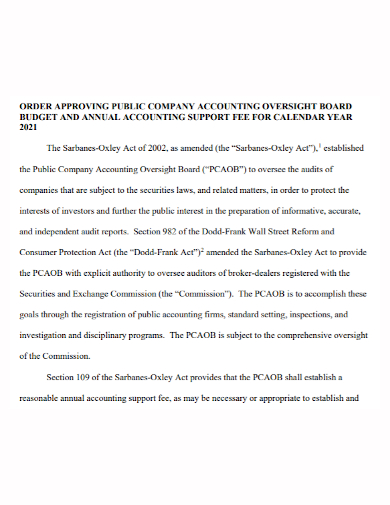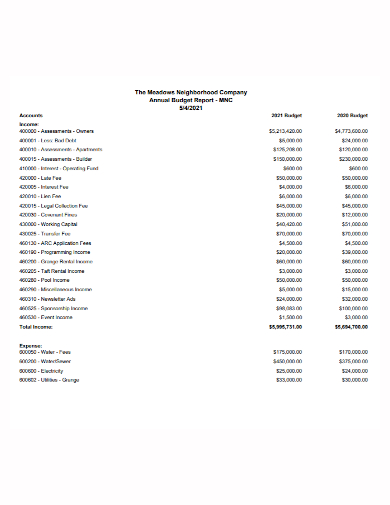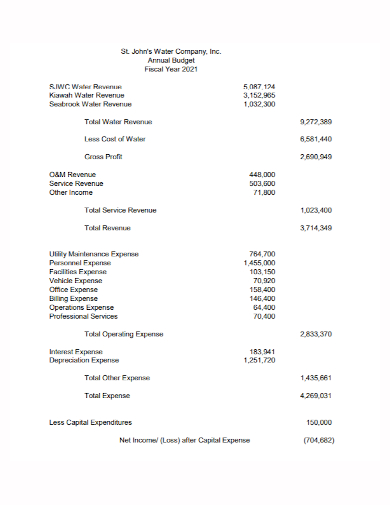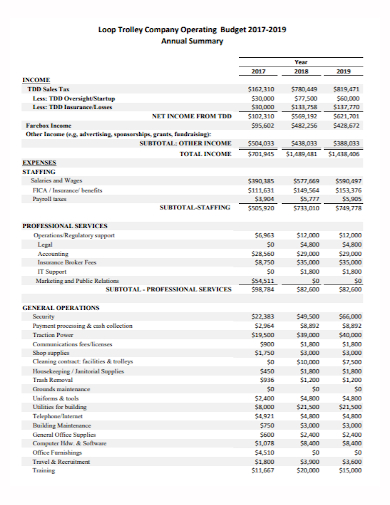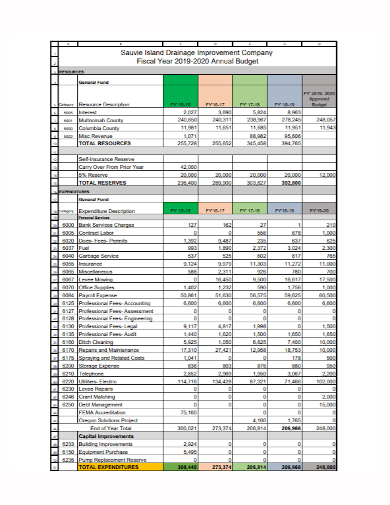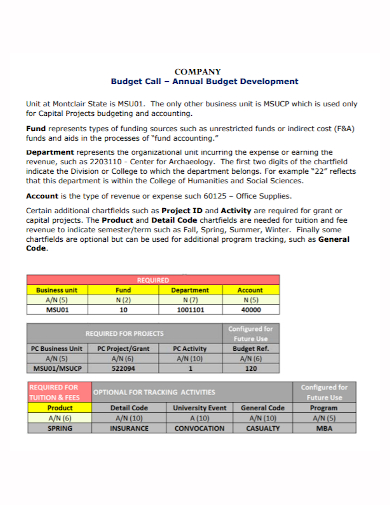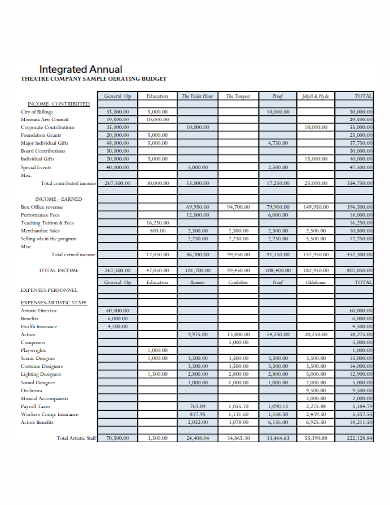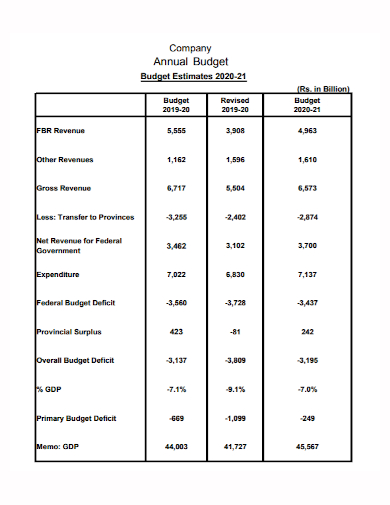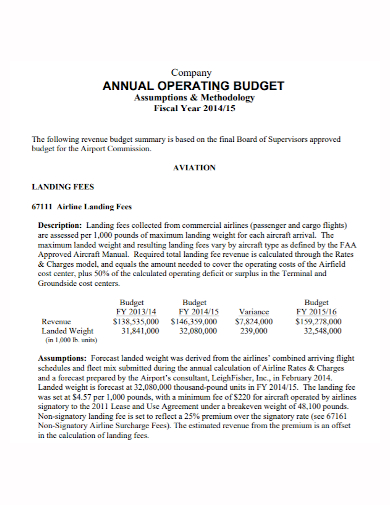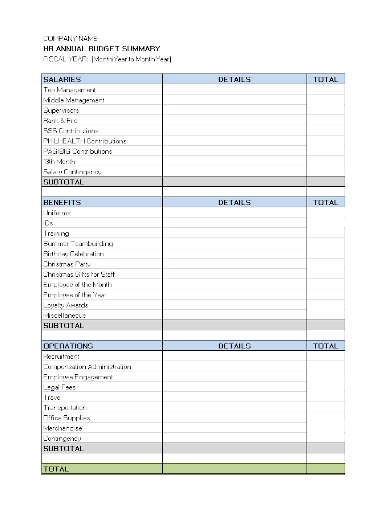During a business plan meeting, one important topic to tackle is a company annual budget or the yearly budget. Budgeting is essential in business management because this will help identify the currently available capital, provide an estimate of expenditure, and anticipates incoming revenue. In most cases, a large portion of a company’s expenses come from the operating cost which would include manpower, raw materials, maintenance, rent, marketing expenditures, rent, legal fees, and many others. That being said, this is why most businesses should come up with a company annual budget to balance out a business’ sources of income against its expenses. Read more about this in our article below, and you may want to check out our free company annual budget samples to help you and your company with your budget plans.
10+ Company Annual Budget Samples
1. Company Annual Budget Template
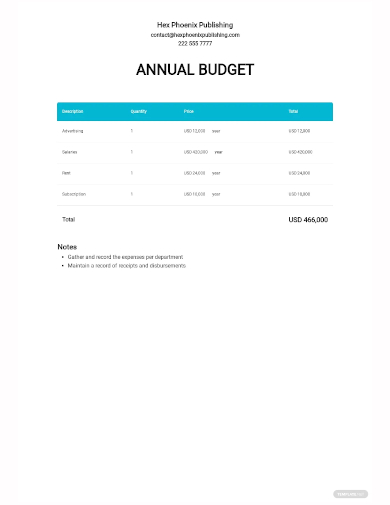
2. Company Account Annual Budget
3. Company Annual Budget Report
4. Water Company Annual Budget
5. Company Annual Operating Budget
6. Company Improvement Annual Budget
7. Company Development Annual Budget
8. Company Integrated Annual Budget
9. Company Annual Budget Estimate
10. Sample Company Annual Budget
11. Company HR Annual Budget
What Is a Company Annual Budget?
Annual budgets can help companies make financial plans for the upcoming year and make all necessary adjustments while doing so. In short, it enhances better financial management while you compare your income and overall expenses. What you do here is lay out a plan for a 12-month period on the company’s projected income versus the expenses. Data from the previous year is also taken into account to compare the trends which can help make calculated financial plans for the next fiscal or calendar year.
How To Create a Company Annual Budget?
While working on your financial data for your annual budget, there are a few things you must be able to understand when it comes to budgeting. When your budget is equivalent to your expenses, it is said that your budget is in balance. When the expenditure is more than your income and that the company needs to borrow money to offset this then the company is said to be in deficit. Whereas if the income exceeds the expenses, then it is called a surplus. A surplus is added to the company’s savings. Now, to create a company annual budget isn’t a one-man show, you need to coordinate with other departments from the company, and gather data for financial comparison. Here are some tips that can help you with this.
1. Gather Your Data
As mentioned, financial data from other departments will organize an annual budget. From the operations, marketing department, HR team, and other relevant company divisions that can contribute data. Don’t forget to include any ongoing projects that may be completed by the next year.
2. Expenses or Expenditures
Based on your data, determine projected expenses or expenditures for the next year. The usual expenses that a company incurs are fixed costs such as rent, insurance, and licenses. Then you have your employee’s wages, benefits, compensation, and recruitment. The operating cost for your products or services, supplier payments, and other expenditures that are relevant in your company’s industry.
3. Revenue / Income
Your projected income will be based on the number of sales, but do you pre-determine this? Comparing data from the previous year can help analyze a consumer’s buying trends over the 12 month period. Another thing is that consider the recent monthly growth rate experienced by the company and decide if it can be continued, and discuss the expected sales with your sales department, and set expectations to help determine compensation for this team.
4. Investments
When the company starts investing in capital expenditures then this must be also be taken into consideration in your budgeting plan.
5. Accounts Payable and Invoices
See to it that your invoices and accounts payable have been paid within the given credit line. One major cause of financial problems is unpaid invoices and payables that have incurred interest.
6. Monitor and Evaluate
Your budget is based on estimated projections, so anything may happen within the given year or so. That being said, it is important to continuously monitor any changes to make sure the company is on the right track. Budgets should always be compared to actual results to understand why there are differences. Doing this will help monitor spending money throughout the year and help management make important decisions in relation to the business.
FAQs
What Is a Business Budget?
A business budget is a detailed summary of the company’s funds. This will determine how and where the funds will be spent on a monthly or yearly basis.
What Is a Finance Department?
A finance department is a part of a business organization that deals with the finances of a company. Their key roles are bookkeeping, tax compliance, financial planning and management, budgeting, and fund raising.
Why Is Annual Budgeting Important?
In any organization, annual budgeting can help manage its financial resources to support the implementation of various programs and projects within the given year. It can also help set up a balance between income and expenses.
Creating a company annual budget may seem like a tedious and complex task, but as you see it is important to help manage your company’s financial plans and provide the right financial decisions to prevent further debt and deficit.
Related Posts
FREE 10+ Advertising Budget Samples in PDF
FREE 10+ Manufacturing Overhead Budget Samples in MS Word | Google Docs | Google Sheets | MS Excel | PDF
FREE 5+ Small Freelance Team Budget Samples in MS Word | Google Docs | Google Sheets | MS Excel PDF
FREE 10+ Annual IT Budget Samples in MS Word | MS Excel | Google Docs | Google Sheets | PDF
FREE 5+ Yearly Budget Planner Samples in PDF | XLS
FREE 10+ Expense Budget Samples in MS Word | Google Docs | Google Sheets | MS Excel | PDF
FREE 4+ Vacation Budget Planner Samples in PDF
FREE 10+ Budget Outline Samples in PDF | MS Word
FREE 10+ Monthly Budget Worksheet Samples in PDF | MS Word | Google Docs | Google Sheets | Excel
FREE 10+ Monthly Project Budget Samples in MS Word | MS Excel | Google Docs | Google Sheets | PDF
FREE 10+ Corporate Budget Samples in MS Word | MS Excel | Google Docs | Google Sheets | PDF
FREE 9+ Primary School Budget Samples in MS Word | Google Docs | Google Sheets | MS Excel | PDF
FREE 10+ Operational Budget Samples in PDF | DOC
FREE 5+ Budget Layout Samples in PDF
FREE 6+ Paycheck Budget Samples in PDF | MS Word

